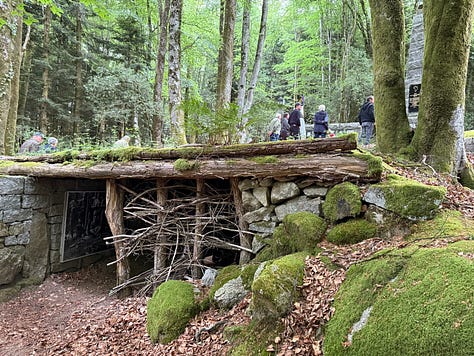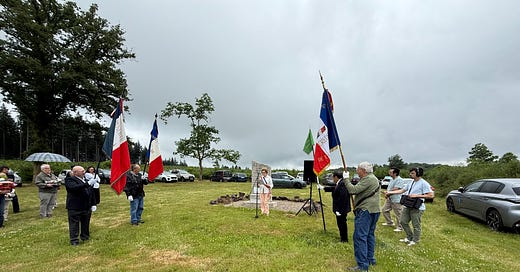As we hiked out of the Bois du Thouraud, a woman sidled up to me and said, “It is difficult to hear about the war.”
I was a bit embarrassed. I realized she had seen me crying while La Marsaillaise played from a tiny Bluetooth speaker improbably attached to the belt of a member of our group. She had to be wondering why this stranger was so upset. I explained that, of course, I was moved by the details of the massacre by the Nazis that took place where we stood, but I also had a very personal reason for being so emotional: We joined this Rally for the Resistance in Creuse to honor my father-in-law’s World War II military service flying secret missions to help the French Resistance.
That was just one of 16 times I would choke up singing the French national anthem as we traveled during 10 intense hours, honoring members of the Resistance who died for France. They have taken this route to remember the dead since 1947. This particular site, deep in woods of the very first camp of Maquisards, was much more than a simple stone placed at a crossroad. It was a large black monument at the very spot where these guerilla warriors lived, fought, died or were deported to concentration camps. It felt especially vivid to stand where they died.



Hearing La Marsaillaise – whether it is played during a July 14 celebration in our Place de la Mairie or in this somber clearing in the woods – seizes me by the throat. Every time. The national anthem of my new country has a haunting melody, an infectious beat and rousing – often horrifying – lyrics.
The song also stirs a sweet memory: My mommy and big sister used to sing it, with great enthusiasm, during car rides to our summer house at the Jersey shore. I don’t know why, or how and when they learned it, but I was enchanted by this fancy language and the chorus:
Aux armes, citoyens,
Formez vos bataillons,
Marchons, marchons !
Qu'un sang impur
Abreuve nos sillons !
These heroes we remembered were shot in the back of the head. Starved to death in concentration camps. Hung. Riddled with machine gunfire. Tortured. Their corpses flung into mass graves or burned on top of the underground shelter where they lived. Some of them didn’t live beyond their teens.
We also remembered Don’s dad, Earl G. Russell, whose secret missions as a member of the “Carpetbaggers” dropped weapons, supplies and Resistance agents into France. I was overwhelmed when the Mayor of the town of Soubrebost told the story of Don’s dad during a speech she gave in front of the field where he made his first delivery, of three Resistance fighters. Again, I cried.
Don – who had made contact with the organizers while researching his father’s service – was asked to lay flowers on the monument. I cried some more.
They played La Marsaillaise. Cried.
Then they hit me with Le Chant des partisans, the haunting anthem of the French Resistance. More crying.
Then, the big one: For the first time during the day’s events, they played The Star Spangled Banner. They played it for Dad. And for us. By this point I was ugly-crying.
I couldn’t stop thinking that, back in the US, the Trump regime was pissing on the precious principles these people died for, the very ideals that led my father-in-law – then a skinny 19-year-old – to slide into the gunner’s position in the back of that plane. The same beliefs led teenagers to blow up bridges, women to leave their newborns to learn how to parachute, fearful families to hide Jewish children in their attics.
These deeply-held values were embraced by the United States in 1776. France followed in America’s footsteps when it created its own Les Droits de l’Homme et du Citoyen in 1789.
Life, liberty and the pursuit of happiness. Liberté, égalité, fraternité.
Meanwhile in the US, masked men were kidnapping immigrants, handcuffing children, and roughing up members of Congress. The President deployed the military against his own citizens.
I pulled myself together before joining the crowd in the town hall for a reception. There’s really nothing quite like sharing a meal with a group of lovely French people – and their chilled rosé, giant strawberry tarts, stinky cheese and little cups of magical and diaphanous savory concoctions – to brighten your mood.
The lunch break also gave me a chance to chat with Madame le Maire Annick Pataud.
I told her that I hadn’t learned much about the war in school but have caught up quickly since I’ve been living among its ghosts. The war feels alive here in France. The spirit of resistance and protest and refusing to settle is palpable – especially during the frequent manifestations. I also told the Mayor that, in light of the current political climate in the US, how taken aback I was to hear our national anthem on French soil. I explained that, while it made me enormously proud of my father-in-law, I also felt ashamed of and grief-stricken for my home country.
She understood, but still seemed puzzled that I would be surprised to hear The Star Spangled Banner.
“Mais, ç’est normal,” she said of playing the anthem.
Of course they would honor the country that helped the French so much. It was unthinkable for her to do otherwise – even considering the current political atmosphere.
I may have spent most of the day crying, but I also managed to learn a lot about courage, commitment, audacity and integrity. I also saw, up close, why this community has spent nearly 80 years laying flowers at the sites of atrocities, and saying the names of the dead:
So they never forget.
Le Chant des Partisans. Forever grateful to Veronique Savoye for introducing me to it.





Merci Theresa et Dan du fond du coeur pour cet émouvant témoignage de votre journée sur les traces de nombreux résistants dont ton père Dan.
I became very emotional as I was reading your pieces. I too, as a now American citizen, am very sad and angry, when I see all the awful and despicable things that are happening here. I am glad to see that in spite of it all the memories of what we (French) owe to the courage and unselfishness of so many Americans continue to be remembered deep inside the French countryside.
Merci pour le lien du Chant des Partisans qui me bouleverse chaque fois que je l'entends.
Poignant and beautifully told. Thank you Theresa - and thank God for Don’s dad and his courageous countrymen and French Resistance fighters who helped save the world. We could use them today.